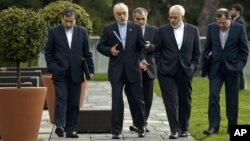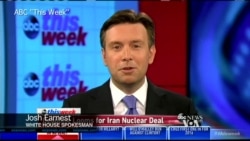Two top foreign ministers helping to negotiate a nuclear deal with Iran are sounding confident that an agreement can be reached by Tuesday's deadline.
Germany's Frank-Walter Steinmeier said Sunday that several elements are missing, and Iran has to be more flexible. But he said he believes Iran wants the talks to end.
Britain's Philip Hammond also said he believes a deal can be done. But he, too, said Iran has to make some tough decisions.
The United States and five other world powers moved toward an agreement with Iran to limit Tehran's nuclear development program, but have yet to reach a final accord.
Diplomats meeting Sunday in Lausanne, Switzerland reported Tehran has shown a willingness to cut the number of nuclear centrifuges it operates to fewer than 6,000 and ship most of its enriched uranium stockpiles to Russia for storage.
In exchange, the countries negotiating with Iran - Britain, China, France, Russia, Germany and the United States - were reported to be considering allowing Iran to conduct limited, closely monitored nuclear testing for medical purposes at an underground facility called Fordow.
But officials monitoring the talks said some contentious issues remain under negotiation as Iran and the six world powers attempt to reach the framework for a deal by their self-imposed Tuesday deadline.
German Foreign Minister Frank Walter Steinmeier described the atmosphere in the talks as "very good," but cautioned that there still could be hurdles to completing a deal.
"I cannot rule out," Steinmeier said, "and this is almost always the case with such negotiations where the stakes are high and in which we feel responsible not only to ourselves but to all the others who are not at the table, I can't rule out that there will be further crises in these negotiations."
In Washington, White House spokesman Josh Earnest told ABC's This Week television news show, "Ultimately it's time for the Iranians to send a clear signal to the international community about whether or not they are willing to make the serious commitments required, and basically live up to their rhetoric, that they are not trying to acquire a nuclear weapon."
Watch Michael Bowman's report:
Right combination
The U.S. official said senior negotiators continue to put ideas on the table during their two to three daily meetings, but they have not found the right combination of terms on the remaining issues.
Ali Vaez of the International Crisis Group, which works with negotiators to try to bridge gaps, is not surprised.
“Negotiations of this much political sensitivity, and of this complexity, and of such high stakes usually have to go down to the wire. There needs to be brinksmanship until the 11th hour. And it really does not depend on one party. It depends on both sides," Vaez said.
The negotiators are not promising an agreement. And if they reach one, they are not saying what form it will take. This is only an interim step to agree on the major elements of an accord. Three more months of negotiating are planned to draft a final, fully detailed agreement.
But Vaez said this interim step is more important than had been expected because it is forcing the negotiators to settle key volatile issues, and because skeptics, most importantly in the U.S. Congress, are demanding proof that the talks are achieving their goals.
Verifiable guarantees
For the United States and its negotiating partners, that means verifiable guarantees that Iran’s nuclear program is purely peaceful. For Iran, the key goal is the easing and eventual end of international economic sanctions.
“The only path forward is one step at a time. And if they are able to get a mutually acceptable formula, the challenges that remain are much less significant than if they are not able to go back to their capitals with some kind of concrete achievement," Vaez said.
The key capitals are Tehran and Washington, but China, Russia, Britain, France and Germany are also part of the talks, and all the foreign ministers are expected in Switzerland for the final push.
Those countries were deputized by the U.N. Security Council to conduct these talks.
The talks are being closely followed by all the Middle Eastern governments, especially Israel, where Prime Minister Benjamin Netanyahu opposes the negotiations because he said they will not end Iran's ability to acquire nuclear weapons.
On Sunday he called the possible deal "very dangerous for humanity."
How to communicate
The senior U.S. official who spoke Sunday said the negotiators will have to communicate the main elements of any agreement in some way, but could not say how that might be done.
Iran’s foreign minister has expressed concern that publishing what would amount to a partial agreement would only provide ammunition to critics. There has been talk that the results of these talks might only be presented orally.
But Vaez and other analysts point out that without something written, the critics will pounce anyway. Still, the experts also note that the U.S. Congress is not in session until mid-April, which could give the negotiators some time to come up with the right format for putting any agreement on paper.






